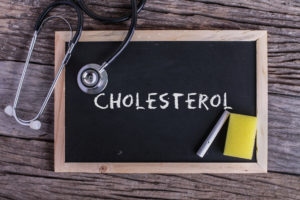September Is Designated “National Cholesterol Education Month”

September is National Cholesterol Education Month, which encourages the public to get their blood cholesterol checked, as well as take the necessary steps to lower it if it is high.
National Cholesterol Education Month is also used as a way to educate ourselves and learn about lipid profiles and about food and lifestyle choices that help you reach personal cholesterol goals. Statistics show that more than 102 million American adults have total cholesterol levels at or above 200 mg/dL, which is above healthy levels — and more than 35 million of these people have levels of 240 mg/dL or higher, which puts them at high risk for heart disease.
At NJdiet, we are taking the opportunity during National Cholesterol
Education
Month to provide you with valuable information on how to take charge of your health and encourage overall wellness.
We will also be taking a look at invaluable tips on how high cholesterol can be prevented, and the diet and lifestyle changes that work to control your cholesterol.
What Is Cholesterol?
Cholesterol is a waxy, fat-like substance found in your body and many foods. This substance can often be found mainly in foods that are sourced from animals. The major carrier of cholesterol in the blood is LDL lipoprotein. LDL cholesterol is known as ‘bad cholesterol’ and this is because high level of this type of cholesterol is directly related to an increased risk of coronary heart disease; while LDL lipoprotein causes the deposit of cholesterol on the walls of the artery which results to a hard, viscous substance known as cholesterol plaque. Over time, the cholesterol plaque leads to the thickening of the artery walls and the arteries becomes narrow which is called atherosclerosis.
Your body needs cholesterol to function normally and makes all that you need; however too much cholesterol can build up in your arteries. After a while, these deposits narrow your arteries, putting you at risk for heart disease and stroke.
NJdiet uses personalized genetic testing to assess each
individual’s specific needs for essential vitamins, plus many more metabolic factors are assessed genetically to make sure you stay healthy for years to come.
Are There Symptoms Of High Cholesterol?
High cholesterol usually doesn’t have any symptoms, which is why many people do not know that their cholesterol levels are too high. However, by going for regular checkups, doctors can do a simple blood test to check your cholesterol. It’s important to check your cholesterol levels, since high cholesterol is a major risk factor for heart disease, the leading cause of death in the United States. High cholesterol can be controlled through diet and lifestyle changes, though sometimes it will need to be controlled through medications.
How Often Should You Be Screened For High Cholesterol?
According to the National Cholesterol Education Program (NCEP), adults should consider getting their cholesterol levels checked every five years after turning 20, and in particular you should be screened if you present the following risk factors for cardiovascular disease, such as:
- High blood pressure (hypertension)
- Regular smokers
- Obesity
- Family medical history
- Diabetes
A simple blood test called a lipoprotein profile can measure your total cholesterol levels, including LDL (low-density lipoprotein, or “bad” cholesterol), HDL (high-density lipoprotein, or “good” cholesterol), and triglycerides.
The following shows optimal lipid levels for adults:
- Total cholesterol: Less than 170 mg/dL
- Low LDL (“bad”) cholesterol: Less than 110 mg/dL
- High HDL (“good”) cholesterol: 35 mg/dL or higher
- Triglycerides: Less than 150 mg/dL
Ways To Control High Cholesterol
There are a number of medications which can be prescribed for high cholesterol, but it’s even more important to incorporate healthier habits into your daily routine.
For example, you can lower your cholesterol levels through the following lifestyle changes:
- Eating more high-fiber foods (Eat more fresh fruits, fresh vegetables, and whole grains).
- For adults, getting at least 2 hours and 30 minutes of moderate or 1 hour and 15 minutes of vigorous physical activity a week. For those aged 6-17, getting 1 hour or more of physical activity each day.
- Maintain a healthy weight.
- Don’t smoke or quit if you smoke.
- Limit trans fats and saturated fats
- Incorporate more sources of omega 3 and other cholesterol lowering foods.
By eating a healthier, heart-friendly diet, you should avoid saturated and trans fats which have been shown to elevate cholesterol levels. However, there are certain types of fats — such as polyunsaturated fats — that can actually decrease blood cholesterol levels. Additionally, increasing your fiber intake can also help decrease cholesterol.
When you become more active, you can also help lower cholesterol. A combination of cardiovascular exercise and weight training works best to lower or control cholesterol level, while also helping to rid the body of excess fat.
Finally, maintaining a healthy weight can help control your cholesterol levels. By carrying excess weight, you often times can raise cholesterol levels. Following a healthy diet and exercising regularly can all help in controlling your well-being, overall health and cholesterol levels, as well.
Under the guidance of Dr. Arthur Turovets, NJdiet has proven that his weight loss program, and how it works,
can be a big step in a patient’s road to a healthy life. NJ
Diet utilizes DNA testing to determine your ideal diet and workout plan. Using blood work, hair and saliva sample, patients typically lose 20-50 pounds in only 40 days.
As you can see, during National Cholesterol Education Month the goal is to educate ourselves, as well as talk about the dangers of high cholesterol. In addition, this month is a perfect time to focus on the importance of getting regular cholesterol screenings, which can help determine if you have a cholesterol issue. By posting about this month’s public health and awareness campaign, you can help in reaching its goals.
When you decide to change your life by attending the Initial Evaluation and Consultation at NJdiet, we will explain how our unique individualized system works to
reduce hunger and feel healthier. We will explain how many metabolic factors are assessed to genetically make sure you not only lose the weight, but ensures you keep it off and stay healthy for a lifetime.
We welcome the opportunity to meet with you at NJdiet. Our
program is not only aimed at promoting healthy weight loss, but aims to improve your total wellness — where the side effect is weight loss, but the end result is better overall health and well being!





